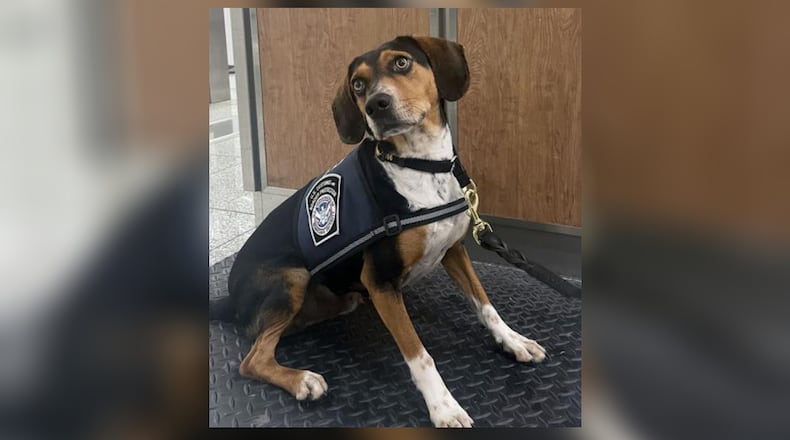Flash’s first day on the job was a busy one.
An eager new member of the U.S. Customs and Border Protection’s Beagle Brigade, he sniffed out infested beans, cow skin, seeds, herbs and other banned agricultural items at the Atlanta airport.
“We are thrilled to welcome Flash to our Atlanta team,” said Clay Thomas, Atlanta Area Port Director for CBP. “His successful detection on his first day underscores the critical role our canine units play in protecting American agriculture.”
Flash’s journey started at the Humane Society in Blue Ridge before he was moved to the National Detector Dog Training Center in Newnan, according to the federal agency. He started his career with the Beagle Brigade, working with highly trained canine handlers, on May 10.
During a typical day, CBP agriculture specialists throughout the country seize 2,677 prohibited plant, meat, animal byproducts, and soil, and intercepted 240 insect pests at U.S. ports of entry.
“Flash’s keen sense of smell and dedicated training are invaluable assets in our ongoing efforts to safeguard our country,” Thomas said.
Credit: KENT D. JOHNSON / AJC
Credit: KENT D. JOHNSON / AJC
Flash joins a proud line of canine agents. The Beagle Brigade has included devoted detectives including Murray, who was rescued by Alcovy Pet Rescue, Inc. from the Northeast Georgia Animal Shelter, and joined the team a few years ago.
The USDA established the detector dog program in 1984 with one beagle at the Los Angeles International Airport. The squad grew and was later renamed the Beagle Brigade.
“Beagles and beagle mixes are the preferred breed of dog at the airport because of their keen sense of smell, non-threatening size, high food drive and gentle disposition with the public,” the CBP said.
The agriculture canine program now exceeds 180 teams that providing screening at locations including border crossings, airports, cruise terminals, cargo warehouses, and mail facilities that process international passengers and commodities, the agency said.
“All the detector dogs at the USDA National Detector Dog Training Center are adopted from rescue shelters in the U.S. or come to the program from private donations,” the agency said.
Credit: U.S. Customs and Border Patrol
Credit: U.S. Customs and Border Patrol
Previous reporting from AJC reporter Zach Hansen was used in this article
About the Author
Keep Reading
The Latest
Featured





